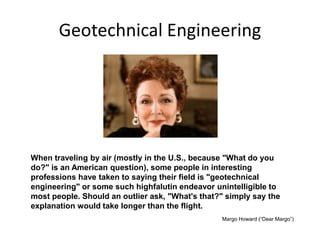7 Easy Facts About Geotheta Explained
7 Easy Facts About Geotheta Explained
Blog Article
The Facts About Geotheta Revealed
Table of ContentsGeotheta - QuestionsThe Definitive Guide to GeothetaGeotheta - TruthsIndicators on Geotheta You Should KnowThe Single Strategy To Use For Geotheta

They carry out site examinations, collect samples, carry out research laboratory examinations, and examine data to assess the viability of the ground for construction jobs - Engineer of Record. Based upon their findings, geotechnical designers supply suggestions for structure layout, incline security, preserving frameworks, and reduction of geotechnical hazards. They collaborate with various other professionals, such as engineers, architectural engineers, and construction teams, to make certain that geotechnical factors to consider are incorporated into the overall job style and implementation
By examining the habits and homes of soil and rock, they can determine possible geotechnical dangers such as landslides, dirt negotiation, or slope instability. Their experience helps protect against failures or crashes that might jeopardize lives and residential or commercial property. Right here are some thorough tasks and duties of a geotechnical designer: Website Examination: Geotechnical engineers conduct website investigations to gather information on subsurface problems.
They analyze the data to comprehend the properties and habits of the soil and rock, including their stamina, leaks in the structure, compaction qualities, and groundwater problems. Geotechnical Evaluation and Style: Geotechnical engineers analyze the information accumulated throughout site examinations to assess the stability and suitability of the website for construction tasks. They execute geotechnical calculations and modeling to assess variables such as birthing capacity, settlement, slope security, side planet stress, and groundwater flow.
What Does Geotheta Mean?
Structure Layout: Geotechnical designers play a crucial function in making structures that can securely sustain the designated framework. They examine the dirt problems and load demands to establish the ideal foundation type, such as superficial structures (e.g., footings), deep structures (e.g (https://trello.com/u/geotheta)., heaps), or specialized strategies like soil renovation. They consider elements such as settlement restrictions, bearing capability, and soil-structure communication to develop optimum foundation styles
They assess construction strategies, monitor website activities, and conduct field examinations to confirm that the style suggestions are complied with. If unpredicted geotechnical concerns arise, they assess the circumstance and supply suggestions for removal or changes to the layout. Danger Evaluation and Mitigation: Geotechnical designers evaluate geotechnical hazards and risks connected with the job website, such as landslides, liquefaction, or dirt erosion.

Partnership and Interaction: Geotechnical engineers work carefully with other experts included in a job, such as architects, architectural designers, and building groups. Effective communication and collaboration are necessary to integrate geotechnical factors to consider into the general job layout and building process. Geotechnical designers provide technical competence, solution questions, and make certain that geotechnical demands are fulfilled.
8 Easy Facts About Geotheta Described
Here are some sorts of geotechnical designers: Foundation Engineer: Foundation designers specialize in making and analyzing structures for frameworks. They analyze the dirt problems, tons demands, and website characteristics to identify the most suitable foundation kind and design, such as superficial structures, deep foundations, view website or specialized strategies like stack structures.
They examine the elements affecting slope security, such as soil residential properties, groundwater conditions, and slope geometry, and establish approaches to avoid slope failings and reduce dangers. Earthquake Designer: Quake designers specialize in evaluating and making frameworks to endure seismic pressures. They evaluate the seismic danger of a site, review soil liquefaction possibility, and develop seismic layout requirements to make certain the security and strength of frameworks throughout quakes.
They perform field testing, gather samples, and assess the gathered data to define the soil residential properties, geologic formations, and groundwater problems at a site. Geotechnical Instrumentation Engineer: Geotechnical instrumentation designers concentrate on monitoring and gauging the actions of dirt, rock, and structures. They mount and keep instrumentation systems that check elements such as dirt settlement, groundwater levels, slope activities, and structural variations to analyze performance and offer early warnings of potential concerns.
An Unbiased View of Geotheta
They conduct tests such as triaxial tests, debt consolidation examinations, straight shear examinations, and leaks in the structure tests to collect data for geotechnical evaluation and layout. Geosynthetics Engineer: Geosynthetics engineers focus on the style and application of geosynthetic products, such as geotextiles, geogrids, and geomembranes. They use these materials to enhance dirt security, strengthen inclines, offer water drainage options, and control disintegration.
They often tend to be investigatory people, which implies they're intellectual, introspective, and inquisitive. They wonder, methodical, rational, logical, and sensible. Several of them are likewise social, indicating they're kind, charitable, cooperative, individual, caring, practical, empathetic, skillful, and friendly. Does this seem like you? Take our free occupation test to discover out if geotechnical designer is among your top profession matches.
In the office atmosphere, geotechnical engineers utilize specialized software application tools to do estimations, produce designs, and evaluate data. They prepare reports, testimonial job specifications, interact with customers and staff member, and coordinate project tasks. The workplace setup supplies a favorable environment for study, analysis, and collaboration with other specialists associated with the task.
All About Geotheta
They often see job websites to carry out website examinations, assess geotechnical conditions, and collect data for analysis. These check outs involve taking a trip to various areas, sometimes in remote or tough terrains. Geotechnical engineers may carry out dirt tasting, conduct examinations, and display building and construction activities to guarantee that the geotechnical facets of the task are being executed correctly.
Geotechnical engineers likewise work in specialized geotechnical labs. Geotechnical research laboratory engineers function thoroughly in these settings, handling testing equipment, running tools, and tape-recording information.
Report this page